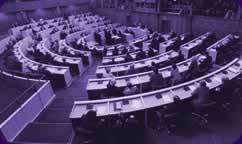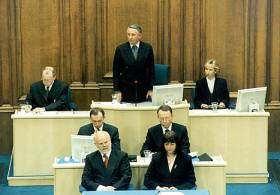 Devolution is the central government giving local government power, so they can make decisions at a level where they will have an impact.
Devolution is the central government giving local government power, so they can make decisions at a level where they will have an impact.
'The Scottish Parliament, adjourned on the 25th day of March in the year 1707, is hereby reconvened.'
Dr Winifred Ewing MSP, Mother of the Scottish Parliament, 12th May 1999.
 This speech and devolution settlement meant that Scotland now has a parliament with ‘devolved’ powers within the United Kingdom. Any powers, which remain with the UK Parliament at Westminster, are reserved.
This speech and devolution settlement meant that Scotland now has a parliament with ‘devolved’ powers within the United Kingdom. Any powers, which remain with the UK Parliament at Westminster, are reserved.
: Matters such as education, health and prisons, which used to be dealt with by the Parliament at Westminster, are now decided in Scotland. : Decisions (mostly about matters with a UK or international impact) are reserved and dealt with at Westminster.  The Scottish Parliament operates as a self-contained and fully functioning Parliament in its own right. Laws can be passed by the Scottish Parliament without going through the Westminster Parliament.
The Scottish Parliament operates as a self-contained and fully functioning Parliament in its own right. Laws can be passed by the Scottish Parliament without going through the Westminster Parliament.
The UK Parliament at Westminster retains power to legislate on any matter, but the convention (way things are normally done) of devolution is that the UK Parliament will not normally make laws on devolved matters without the consent of the Scottish Parliament.

 Devolution is the central government giving local government power, so they can make decisions at a level where they will have an impact.
Devolution is the central government giving local government power, so they can make decisions at a level where they will have an impact. This speech and devolution settlement meant that Scotland now has a parliament with ‘devolved’ powers within the United Kingdom. Any powers, which remain with the UK Parliament at Westminster, are reserved.
This speech and devolution settlement meant that Scotland now has a parliament with ‘devolved’ powers within the United Kingdom. Any powers, which remain with the UK Parliament at Westminster, are reserved. The Scottish Parliament operates as a self-contained and fully functioning Parliament in its own right. Laws can be passed by the Scottish Parliament without going through the Westminster Parliament.
The Scottish Parliament operates as a self-contained and fully functioning Parliament in its own right. Laws can be passed by the Scottish Parliament without going through the Westminster Parliament. The Parliament has a Scottish Executive comprising of:
The Parliament has a Scottish Executive comprising of: